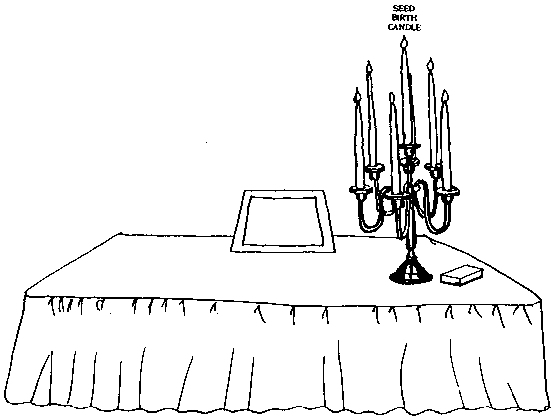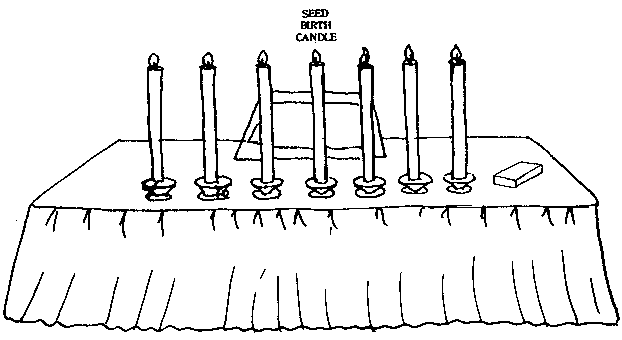![]()
The Tradition, Book One
![]()
by Rev. Chung Hwan Kwak
|
|
The Tradition, Book One |
|
|
|
by Rev. Chung Hwan Kwak |
[Page 160]
Chapter 19
Births, Birth Ceremony
Births
Significance
One of the most precious relationships is that experienced between husband and wife. The purpose of God's creation is love -- as a personal experience, not only as a philosophical theory.
As the Principle explains, people encounter three stages of love -- parent's love, spouse's love, and love for children. We first learn about love as we receive love from our parents. Upon that experience, we climb to the second stage and more completely open ourselves by giving and receiving the love of one person. This love is essential in the process of procreating children as we complete the four position foundation.
Husband and wife have many ways to express love to each other, but the most precious is the intimate marriage relationship. Heavenly Father is always involved in the giving and receiving of this love. Even though in the fall love was taken and completely dominated by Satan's false control, it is still in accord with the Principle that God is present to some extent in every giving and receiving action.
When husband and wife generate real harmony, God wants to work with them. Unlike animal sexuality, conjugal love relationships among humans are not simply for the purpose of procreation. The love human beings can experience in conjugal communion is extremely precious and meaningful. As it develops, love becomes deeper and deeper.
In this sense, all new life relates directly to God. God's involvement in the love shared between a husband and wife can produce a child. Thus we can say that God is our Parent. A child's life is precious to the parents because the child is a living testimony of their love. God
[Page 161]
and the child are actually both special participants in the love relationship.
According to the Principle, any kind of intimate relationship without the participation of one's spouse is unthinkable and totally against the original ideal of God. Spouses are to reach complete unity centering on true love. They would never be tempted by other people because they have the potential to feel complete fulfillment of love in their marriage.
Unification Church View on Contraception
Father has made several references to birth control in various speeches to blessed couples. Father views the creation of each new child as a most precious event which will bring eternal blessings. Father views children as a blessing which we would not want to deny God or ourselves. However, he does not stress a negative attitude by considering the use of birth control a sin. Theologically, within the blessed marriage the Unification Church considers marital relations apart from the purpose of procreation as holy. Artificial forms of birth control, however, are not favored. Blessed couples are encouraged to use the most natural methods of birth control for special circumstances such as health problems.
Father has often encouraged blessed couples not to eternally regret limiting their families but rather to view children as blessings from God.
Unification Church View on Abortion
According to the Unification viewpoint, love and life are incredibly precious and to be valued above all else. God personally attends the creation of new life. The relationship of love between the parents and child is part of the law of the cosmos.
It is our fundamental concern that the order of the cosmos not be interrupted. According to the Principle, the spirit self is not with the embryo in the mother's womb. The mother's womb grows only the spirit base, not the spirit itself. Abortion destroys that spirit base; therefore, the Unification view is that abortion cuts the relationship this unborn child has with God and God's divine love.
When Abortion Is Not Acceptable for Unification Church Members.
Economic situation. We do not have the authority to interrupt the physical order of the cosmos based on lack of finances. Economic considerations can never be compared with the value of life. We
[Page 162]
cannot presuppose God's will. Perhaps God has special plans for that particular child to influence future history.
If a couple has financial problems, it is their responsibility to exercise the most natural methods of birth control.
Lack of harmony. Abortion should also not be considered if couples feel that their relationship at the time of conception was not very loving.
When Abortion Is Acceptable for Unification Church Members.
Mother's health endangered. If carrying a child full term endangers the mother's health, abortion is acceptable. The life of the mother is considered more precious because she does possess a spirit, whereas only the spirit base has formed in an embryo. In this sense, we do not view abortion as a sin, as it relates not to a violation of the spirit self but the physical life.
It is important to ask what one's doctor would do if he or she needed to choose between saving the mother or child due to complications at childbirth. According to the view contained within the Principle, the mother should always be saved because, again, she is the only one of the two beings possessing a spirit body. The Principle explains that it is essential to have a physical body for the spiritual body to grow. As mentioned earlier, while in the womb, the child does not have a spiritual body; God imparts the spirit with the first breath.
Child's health endangered. If certain tests (e.g., amniocentesis or chronic samples) confirm that the unborn child has irreversible deformities that would seriously inhibit life (i.e., spina bifida, Down's syndrome, etc.) it is appropriate to abort; however, the decision rests with the parents.
Abortion is appropriate if the child was conceived through rape, incest, or any circumstance involving a break in the spiritual order.
Unification Church View on Circumcision
The Unification Church takes the position that there is no spiritual reason for circumcision. It is not the customary practice in many nations throughout the world, although Western hospitals offer the option of circumcising male children. Medical reasons given for the practice usually relate to hygiene; however, recent studies question that justification.
Since there is no spiritual reason to do this, many members have chosen not to circumcise; however, this decision should be made by the parents themselves. Throughout the church as a whole, there is a strong tradition not to circumcise.
[Page 163]
Birth Ceremony
History
The tradition of burning Birth Candles during the delivery of a baby was begun at Ye Jin Nim's birth. As well, with her birth began the tradition of having close friends or family gather to pray during the delivery.
Significance
Because of the True Parents' course of restoration, all Unification Church members have the opportunity to receive new life. In fact, we are the only generations in all history able to receive the Blessing directly from the True Parents. We must express our gratitude for the fortune and privilege of embracing heavenly blessed children; previously there were no children whom Heaven could claim. Yet blessed children are born in impure environments. Holding a prayer ceremony and burning Birth Candles during delivery creates a condition to make a holy environment for each new blessed child.
Prayer During Delivery
Notification of Participation. Any number of friends (members of one's trinity, if possible) of the couple may gather to pray during the birth. Traditionally, members have gathered to hold such a prayer service after receiving information that the mother has gone to the hospital and/or into the labor or delivery room.
If possible, the parents-to-be should contact their trinity members and other members close to them some time before the baby is due, requesting their participation in such a ceremony.
Location. In some cases, the doctor or midwife may permit this ceremony to be done in the hospital (although away from the actual delivery room). If this is not possible, the ceremony may be held at the couple's home or another convenient location.
If some people contacted are too far away to join the group gathering to pray, they may pray individually at another location. It is appropriate for members in this situation to burn a Shimjung Candle if desired and convenient.
Ceremony Preparation
Advance Preparations. Before the birth of their first child, a couple must personally inherit a Birth Candle and Birth Matches from a
[Page 164]
church elder or elder blessed couple. This "seed" Birth Candle must be multiplied either before storing it directly after the inheritance ceremony, or shortly before the baby is due. (Refer to chapter 16, Birth Candles, for details.)
If possible, the parents should sanctify the area for prayer with Holy Salt.
Before Delivery. At the time the parents go to the hospital, all those who will participate in the prayer ceremony should be contacted.
Before leaving for the hospital, the parents should prepare the candles for those who will gather to pray. The "seed" Birth Candle should be placed in the middle position of a candelabra or in the center of seven individual candle holders on the altar. The multiplied candles should be placed in the other places in the candelabra or other candle holders. (Refer to diagrams 19.1 and 19.2 for two possibilities of how the candles might be placed on the altar.) Birth matches should be placed near the candles.
Designate one representative the responsibility of lighting the candles.

Figure 9-1
19.1. Suggested placement of candelabra of Birth Candles on altar
[Page 165]

Figure 9-2
19.2. Suggested placement of seven individual Birth Candles on altar
Format of the Ceremony
If possible, near the time of the actual delivery, one of the people who accompanied the mother to the hospital should try to telephone those gathered to pray in order that they may light the Birth Candles.
Lighting the candles. It is not advisable to light the candles the very moment the mother goes into labor because it is not possible to determine how long her labor will last.
The seven candles may be lit about five minutes before the baby is expected to be born and extinguished about five minutes after the birth. (Refer to chapter 16, Birth Candles, for instructions on both lighting and extinguishing the candles.)
Format of Prayer Service. There is no specific format for prayer. Each person may wish to offer a prayer or several people may pray representative prayers followed by unison prayer. However, if desired, all people may pray in unison the entire time.
There is no set time to pray either before or after the birth.
If the Time of Birth Was Missed
If the ceremony must be carried out at a time other than during the actual birth (before or after because, for example, there was no telephone to reach those who gathered), a special prayer should be offered. One representative should pray, "Even though we were not aware of
[Page 166]
the accurate time of birth, we pray that our prayers can relate to the accurate time and circumstances of birth."
If The Tradition Was Not Known
If this tradition was not known, it is suggested that as soon as a couple learns about this custom, they arrange to inherit a Birth Candle, multiply it according to the instructions in chapter 16, Birth Candles, and hold a prayer service.
Prayers should focus on the idea that even though this tradition was not followed at the time of the birth, through the lighting of the Birth Candle now, the strength of the prayers may connect to creating a blessed environment for this child.
[Page 167]
Download entire book in ZIP format
Table of Contents
Copyright Information